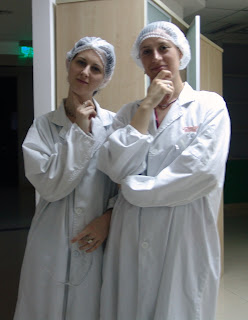As much as I know that Chinese factories must exist all around me making all of those "Made in China" goods, I hadn't ever gotten to see one in operation. It was so interesting. This factory makes cosmetics products like face cleansers, lotion, toner, lipstick, whitening cream (quite the popular cosmetic item in China . . . they can't believe that we buy products to make our skin darker), and other products for the L'Oreal brand as well as Maybelline and Garnier and two other Chinese brands. We got to see their raw materials warehouse, the huge vats they use to mix the products, workers filling bottles and tubes, conveyor belts sending out the finished product that was then packaged and boxed up. The manager explained to us that some of their production lines are automated but most of them are still manually run by a number of employees who handle each item as it's produced. The manager also said that L'Oreal's factories in France and America are completely automated but that outfitting one automatic production line can cost 10 million RMB (US$ 1.4 million). Interesting to get such a real life illustration of why companies outsource their factories to places where manual labor is still affordable and in demand.
I'm currently halfway through Thomas Friedman's book The World Is Flat in which he talks a lot about outsourcing and off-shoring and the way that globalization has flattened the world through the great leaps and bounds in communication and transportation development that the world has seen in the last 10 years. If you're at all interested in the subject of globalization, it's definitely worth the read. I felt like I put the book down, stepped out my front door and got to see for myself exactly what he was explaining in the book.
It's company policy not to allow photos inside the actual plant, but here are a few pictures of Katie and me with the students who are in our class before we got our plant tour. We had to wear white lab coats, safety shoes and glasses, and hairnets to be allowed inside.



No comments:
Post a Comment